Key takeaways:
- Customer loyalty is built on emotional connections, trust, and consistent positive experiences with a brand.
- Loyal customers contribute valuable feedback and insights, enhancing services and solidifying community ties.
- Personalized interactions and proactive communication are effective strategies for fostering loyalty.
- Utilizing analytical tools and regular feedback loops can significantly improve user engagement and customer satisfaction.
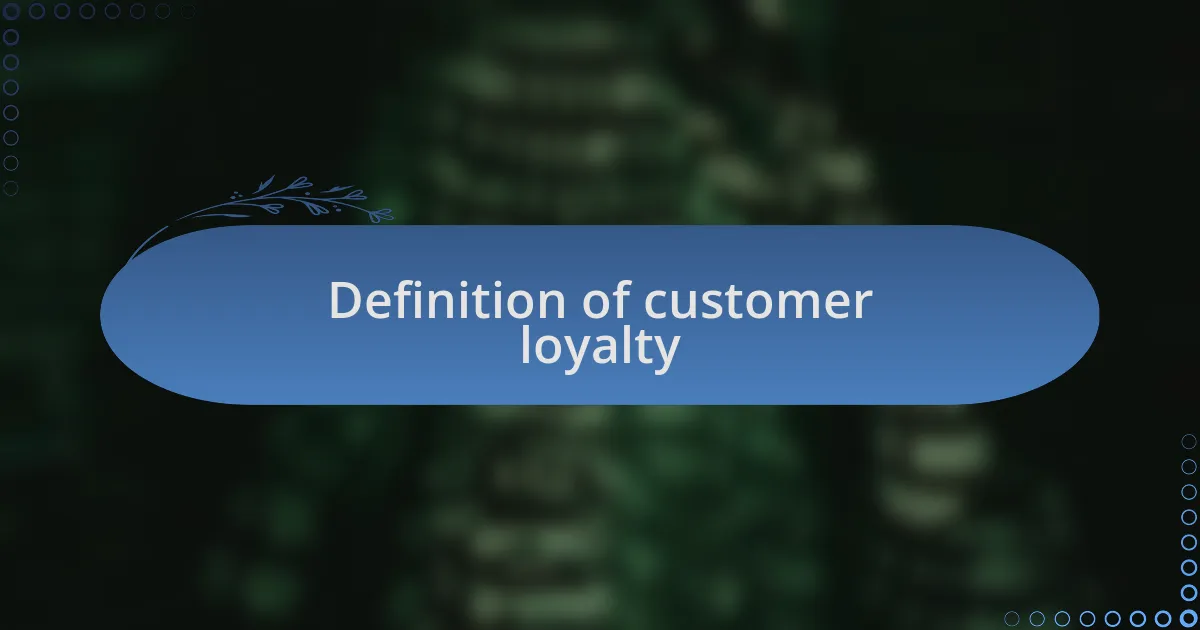
Definition of customer loyalty
Customer loyalty is more than just repeat purchases; it embodies a deep emotional connection between a customer and a brand. When customers feel valued and understood, they’re more likely to choose your services over competitors. Have you ever had a favorite restaurant where you felt like family? That sense of belonging is what drives loyalty.
In my experience, loyal customers often become vocal advocates for your brand, sharing their positive experiences with friends and family. It’s intriguing to think about how a good interaction can turn a one-time customer into a lifelong supporter. Have you noticed how some brands make you feel special with personalized communication? This is what builds a lasting relationship.
At its core, customer loyalty reflects trust and satisfaction. When customers consistently receive quality service or products, their commitment deepens. Have you ever returned to a shop just because of the service you received? Those moments are not coincidental; they are the result of businesses fostering loyalty through genuine engagement and positive experiences.
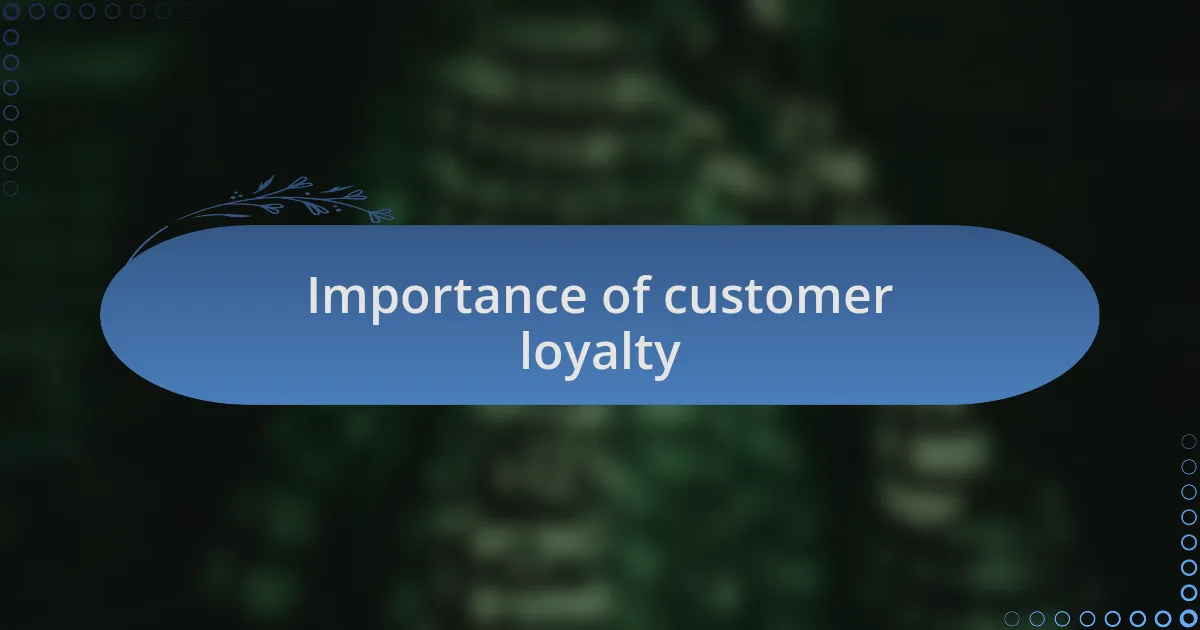
Importance of customer loyalty
Customer loyalty serves as the backbone of any successful business. When customers consistently choose your services, it not only boosts revenue but also creates a strong foundation for your brand. I remember a time when I had a client whose repeat orders were so consistent that they became a crucial part of my business’ growth strategy. It made me realize just how powerful loyalty can be.
Moreover, loyal customers tend to provide invaluable feedback. They don’t just stick around; they also share insights that help improve services and products. Reflecting on my experiences, I’ve noticed that those who feel valued often become the most vocal in sharing their opinions. Isn’t it interesting how that dynamic works?
In addition to financial benefits, customer loyalty fosters a sense of community. When people connect with a brand and its values, they become part of something bigger. I often think of brands that I resonate with personally; I feel a sense of pride in supporting them. This emotional investment is what turns customers into brand ambassadors, further extending your outreach.
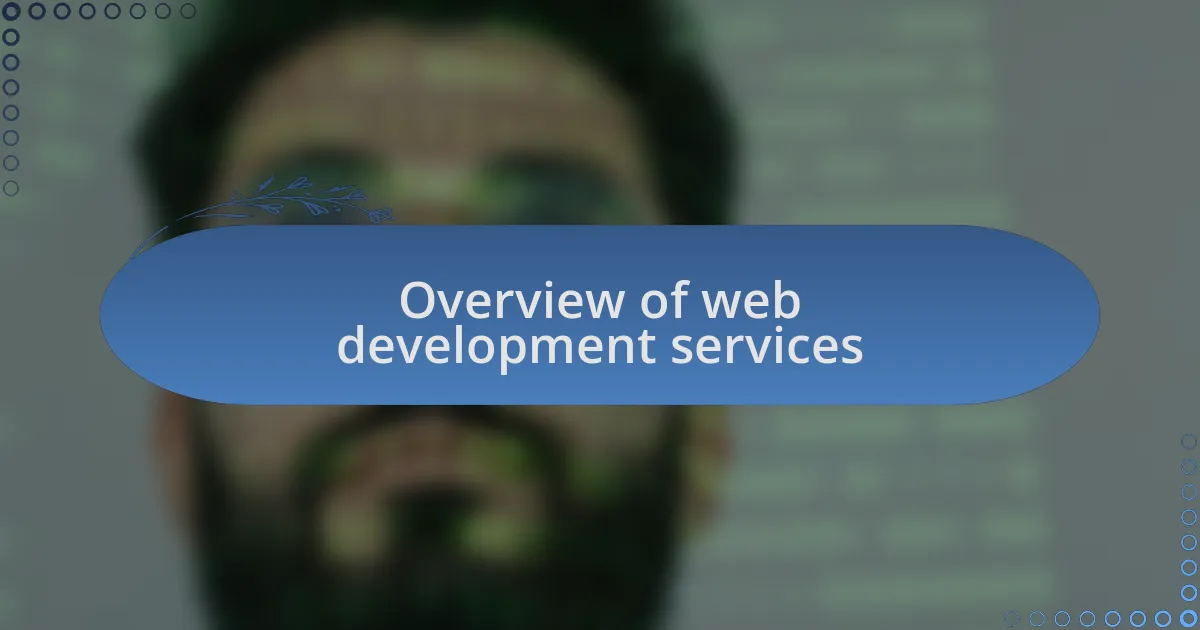
Overview of web development services
Web development services encompass a wide range of activities that help businesses establish a robust online presence. From designing user-friendly websites to ensuring seamless functionality, each aspect is tailored to meet specific client needs. I recall a project where I had to balance aesthetics with functionality, a challenge that turned out to be rewarding as the client saw a remarkable increase in user engagement.
Beyond just creating websites, these services also include search engine optimization (SEO) and mobile responsiveness. I remember a time when a client’s site was virtually invisible online until we focused on optimizing it. With the right tweaks, their traffic surged, leading to new customer acquisitions. Isn’t it fascinating how a few strategic changes can completely alter a company’s trajectory?
Furthermore, web development isn’t just about coding; it involves ongoing website maintenance and support. Maintaining relationships with clients during this phase often reveals their evolving needs. I’ve experienced firsthand how these interactions can spark innovative ideas for future enhancements. After all, isn’t a website more than just its launch? It’s an ever-evolving platform that reflects the growing needs of its audience.
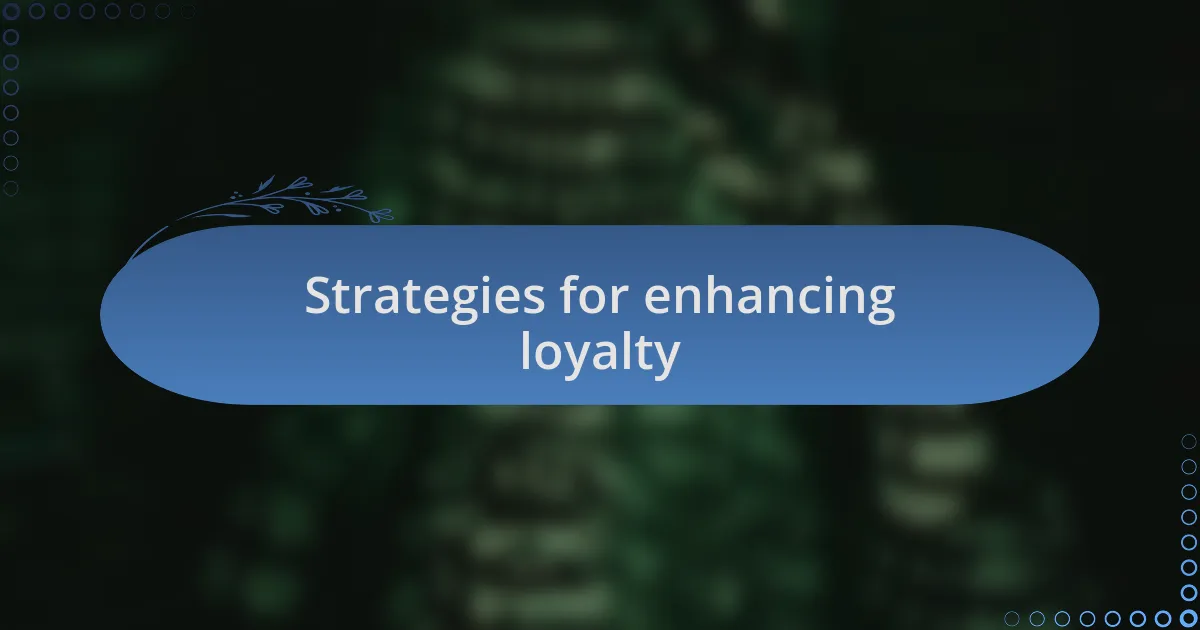
Strategies for enhancing loyalty
Building customer loyalty requires more than just delivering a great product; it’s about fostering genuine relationships. In my experience, one effective strategy is personalizing interactions based on user behavior. For instance, I once implemented a system where we sent tailored content to users based on their previous purchases. The feedback was overwhelmingly positive and strengthened their connection to the brand. Doesn’t that make you think about how often clients appreciate being recognized as individuals rather than just a number?
Another vital strategy to enhance loyalty is to create engaging communities around your services. I recall launching a forum for a client where users could share experiences and support each other. It was rewarding to see not only increased engagement but also a sense of camaraderie among users. When customers feel like they belong to a community, they tend to stick around longer. Have you ever felt a stronger loyalty to a brand because of the friendships you made within its community?
Moreover, I learned that actively seeking customer feedback can be transformative. After each project, I send a survey asking clients to rate their experience and suggest improvements. Surprisingly, this approach not only highlighted areas for enhancement but also showed clients that their opinions mattered. Have you ever considered how empowering your customers can be beneficial for both parties? By involving them in development decisions, you cultivate trust and loyalty that directly impact long-term success.
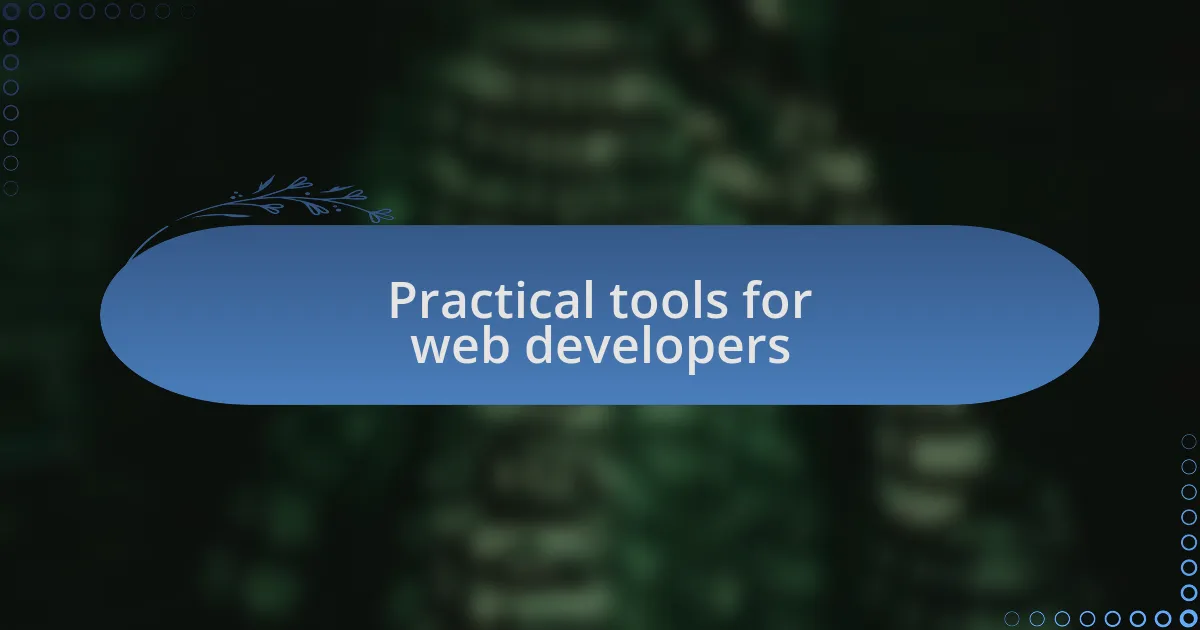
Practical tools for web developers
Practical tools for web developers can significantly enhance the efficiency of their projects. For instance, when I started using version control systems like Git, my workflow transformed. Keeping track of changes and collaborating with my team became a breeze! Have you ever experienced that feeling of relief when knowing you can easily revert to a previous version if something goes wrong?
Another tool that I find invaluable is a robust code editor, like Visual Studio Code. With its extensions and customizable features, I’ve been able to boost my productivity while developing websites. I remember integrating a linting tool that automatically flagged coding standards—this not only saved time but also reduced mistakes. Doesn’t it feel good when tools work alongside you to make your code cleaner and more efficient?
Finally, I can’t rave enough about the importance of analytics tools like Google Analytics. By diving into user data, I discover valuable insights on how visitors interact with websites. One time, I noticed a high drop-off rate on a particular page, which prompted me to redesign that section. The positive impact on user engagement was rewarding. Have you found that even small adjustments can significantly enhance user experience? With the right tools at your disposal, these insights become powerful allies in fostering customer loyalty.
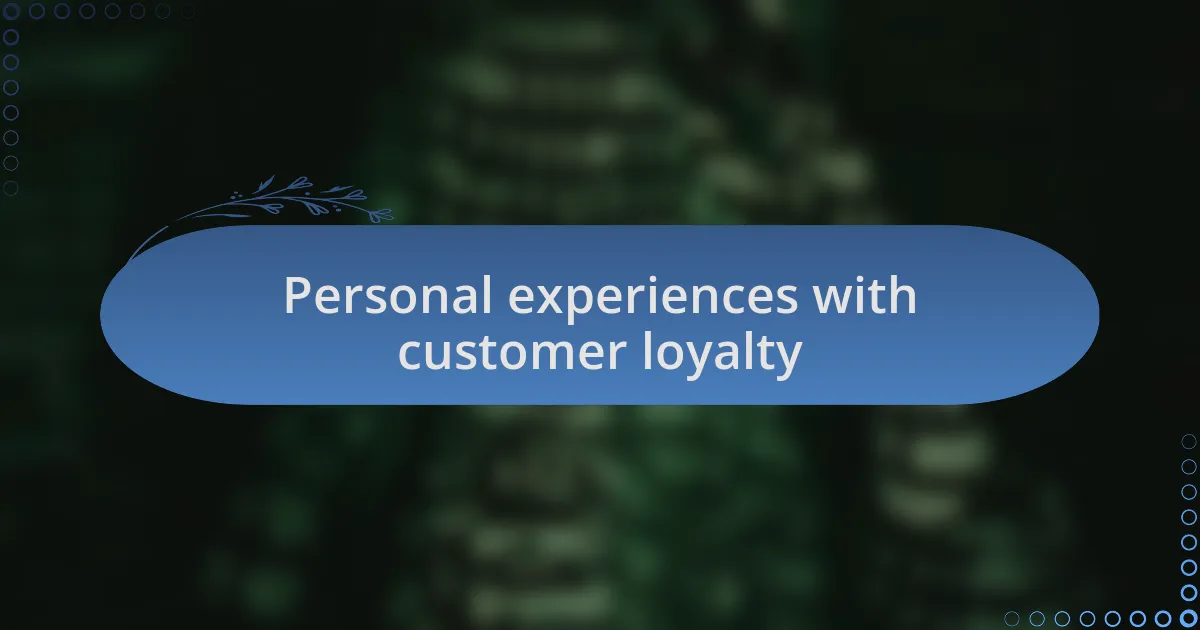
Personal experiences with customer loyalty
Building customer loyalty has been pivotal in my web development journey. I recall a client who was initially skeptical about investing in a more user-friendly website. After we implemented a few changes based on their feedback, their engagement skyrocketed, and they expressed gratitude for listening to their needs. Has there ever been a moment when you realized just how impactful genuine communication can be? It was a turning point for me, highlighting the importance of understanding and responding to client wishes.
There’s also a particular project that stands out in my mind. We launched a new feature that allowed users to save their preferences for future visits. Afterward, the client told me how delighted their users were, and that sentiment became contagious. I could feel the pride swell in both my chest and theirs. When you see your work truly resonate with people, doesn’t it reinforce that sense of purpose and connection with your work?
I also remember an instance where I followed up with a client after a project was completed, just to check in. That simple gesture transformed our relationship; it turned a one-time client into a long-term partner. It’s fascinating how small actions can cultivate loyalty, isn’t it? For me, maintaining this connection has been essential in creating valuable, lasting relationships in the web development field.
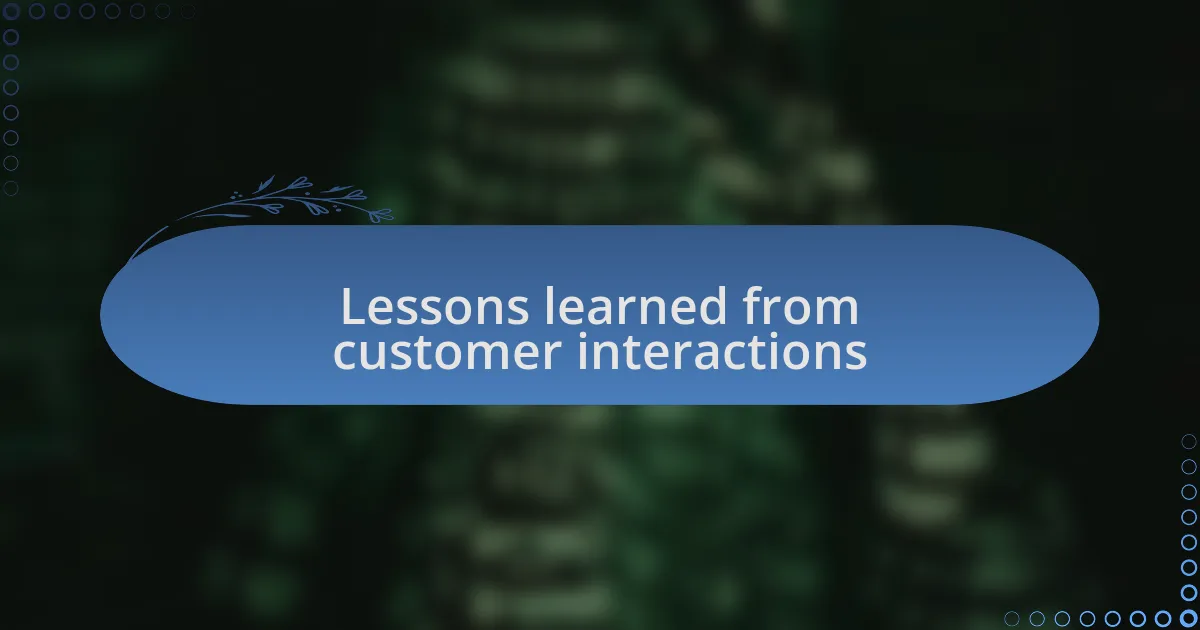
Lessons learned from customer interactions
Engaging with customers often reveals unexpected insights. I once had a client who felt overwhelmed by their site’s analytics dashboard, claiming it was “like reading hieroglyphics.” Instead of brushing off their concerns, I organized a training session to help them navigate the data. Watching their confidence grow as they learned was immensely rewarding. Have you ever witnessed someone transform through understanding? That experience taught me that simplifying complex information not only enhances customer satisfaction but also builds trust.
Then there was the time I received direct feedback about a website loading too slowly. It stung a bit; I thought we had optimized everything perfectly. However, rather than becoming defensive, I took a step back. I gathered the team, and we tackled the issue head-on. The result? A much-improved site and a grateful client. Isn’t it fascinating how constructive feedback can lead to innovation? I’ve learned that embracing criticism can truly elevate the quality of my work.
Additionally, I started incorporating regular feedback loops into my projects. A simple survey after each phase let clients express their thoughts in real time. I recall one particular survey where a client shared their struggle with a specific feature. By addressing their concern quickly, we not only salvaged the project but deepened our relationship. It’s an enlightening lesson: proactive communication fosters loyalty and keeps the lines of connection open. How often do we seek out feedback when we could be building stronger relationships?